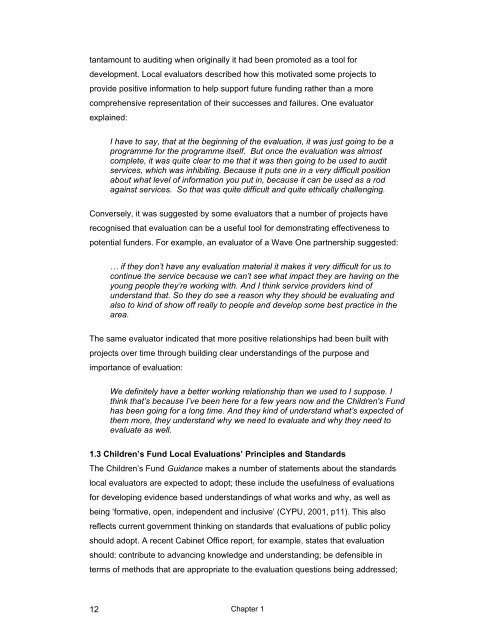Local Evaluation of Children's Services Learning from the Children's ...
Local Evaluation of Children's Services Learning from the Children's ...
Local Evaluation of Children's Services Learning from the Children's ...
- No tags were found...
Create successful ePaper yourself
Turn your PDF publications into a flip-book with our unique Google optimized e-Paper software.
tantamount to auditing when originally it had been promoted as a tool fordevelopment. <strong>Local</strong> evaluators described how this motivated some projects toprovide positive information to help support future funding ra<strong>the</strong>r than a morecomprehensive representation <strong>of</strong> <strong>the</strong>ir successes and failures. One evaluatorexplained:I have to say, that at <strong>the</strong> beginning <strong>of</strong> <strong>the</strong> evaluation, it was just going to be aprogramme for <strong>the</strong> programme itself. But once <strong>the</strong> evaluation was almostcomplete, it was quite clear to me that it was <strong>the</strong>n going to be used to auditservices, which was inhibiting. Because it puts one in a very difficult positionabout what level <strong>of</strong> information you put in, because it can be used as a rodagainst services. So that was quite difficult and quite ethically challenging.Conversely, it was suggested by some evaluators that a number <strong>of</strong> projects haverecognised that evaluation can be a useful tool for demonstrating effectiveness topotential funders. For example, an evaluator <strong>of</strong> a Wave One partnership suggested:… if <strong>the</strong>y don’t have any evaluation material it makes it very difficult for us tocontinue <strong>the</strong> service because we can’t see what impact <strong>the</strong>y are having on <strong>the</strong>young people <strong>the</strong>y’re working with. And I think service providers kind <strong>of</strong>understand that. So <strong>the</strong>y do see a reason why <strong>the</strong>y should be evaluating andalso to kind <strong>of</strong> show <strong>of</strong>f really to people and develop some best practice in <strong>the</strong>area.The same evaluator indicated that more positive relationships had been built withprojects over time through building clear understandings <strong>of</strong> <strong>the</strong> purpose andimportance <strong>of</strong> evaluation:We definitely have a better working relationship than we used to I suppose. Ithink that’s because I’ve been here for a few years now and <strong>the</strong> <strong>Children's</strong> Fundhas been going for a long time. And <strong>the</strong>y kind <strong>of</strong> understand what’s expected <strong>of</strong><strong>the</strong>m more, <strong>the</strong>y understand why we need to evaluate and why <strong>the</strong>y need toevaluate as well.1.3 Children’s Fund <strong>Local</strong> <strong>Evaluation</strong>s’ Principles and StandardsThe Children’s Fund Guidance makes a number <strong>of</strong> statements about <strong>the</strong> standardslocal evaluators are expected to adopt; <strong>the</strong>se include <strong>the</strong> usefulness <strong>of</strong> evaluationsfor developing evidence based understandings <strong>of</strong> what works and why, as well asbeing ‘formative, open, independent and inclusive’ (CYPU, 2001, p11). This alsoreflects current government thinking on standards that evaluations <strong>of</strong> public policyshould adopt. A recent Cabinet Office report, for example, states that evaluationshould: contribute to advancing knowledge and understanding; be defensible interms <strong>of</strong> methods that are appropriate to <strong>the</strong> evaluation questions being addressed;12Chapter 1
















